#gap theory
Explore tagged Tumblr posts
Text
0 notes
Text
The Wonder of Creation: Exploring the Purpose and Relevance of the Creation Narrative in Apologetics
The first eleven chapters in the Bible are my favorite chapters. As someone who questioned their veracity before I started following Jesus, I understand that there are some difficult things in these chapters. When we read these chapters, we read them like 21st century Americans who are obsessed with particular orders of events and the scientific method—things that the Hebrew people were not…
#allegorical interpretation#andrew paul#answers in genesis#apologetics#bible study#Christian#Christianity#Christoa#church#commentary#could the#creation#creation account#free#gap theory#genesis 1#in the Bible#legend#light precedes stars#literal 6 day#literal interpretation#myth#precreation theory#Sermon
1 note
·
View note
Text
L’ombra della massoneria sulle Assemblee di Dio in Italia (ADI): 33) Le teorie scientifiche inventate da massoni accettate dalle ADI [ATTENZIONE! Leggete anche la mia nota finale]
33) Le teorie scientifiche inventate da massoni accettate dalle ADI
L’ombra della massoneria sulle Assemblee di Dio in Italia (ADI): 33) Le teorie scientifiche inventate da massoni accettate dalle ADI 1. La Gap-theory (o Teoria Restituzionista) 2. La teoria dei miliardi di anni della terra Come ho detto in precedenza, Ernesto Nathan (1845-1921), Ebreo di origine inglese primo sindaco di Roma, che fu Gran Maestro del Grande Oriente d’Italia (lo fu dal 1896 al…

View On WordPress
0 notes
Text
Alternative Creation Theory No.2 - The Gap Theory
By Donald Whitchard Genesis 1:1-2,Genesis 1:31,Genesis 2:1-3,Psalm 33:6,Isaiah 45:12,Acts 17:24 Summary: There are four “theories” used by some believers to explain our origins apart from the biblical account of creation. We looked at “theistic evolution.” Now we will look at the “Gap Theory.” Is it a legitimate alternative? We need to examine its claims. Four basic creation “theories”…

View On WordPress
1 note
·
View note
Text



























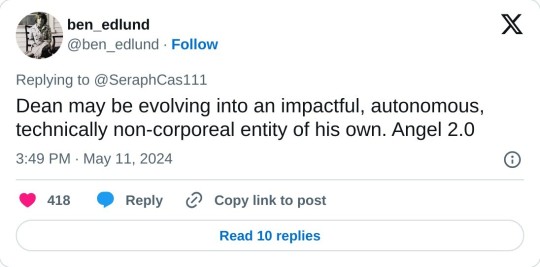


The Winchesters' underlying plot and unreliable narration of Dean as the new restless spirit, the new angry god (interference from on high) leeching trauma brainworms onto his parents' love story as he can find no happy ending without his beloved (his partner in apotheosis) in it
#probably the most important post in this series. maybe ''fan theory'' territory but look at the gaps in what he's telling us and welp-#but after his process of putrefaction was rudely [OMITTED] this is how he'll blossom in eternity. and Cas is in the Garden#(this is the opposite of deancrit ftr he deserves to love selfishly and fuck shit up: canon fix of the finale in progress please standby!)#subtextcontextcleartext#the winchesters#supernatural#spn#dean winchester#castiel#destiel#spnedit#spn meta#spnwin 1.13#dean is bi#spn is queer#mine
255 notes
·
View notes
Text
why does gitae look more related to shingen than gun does lol





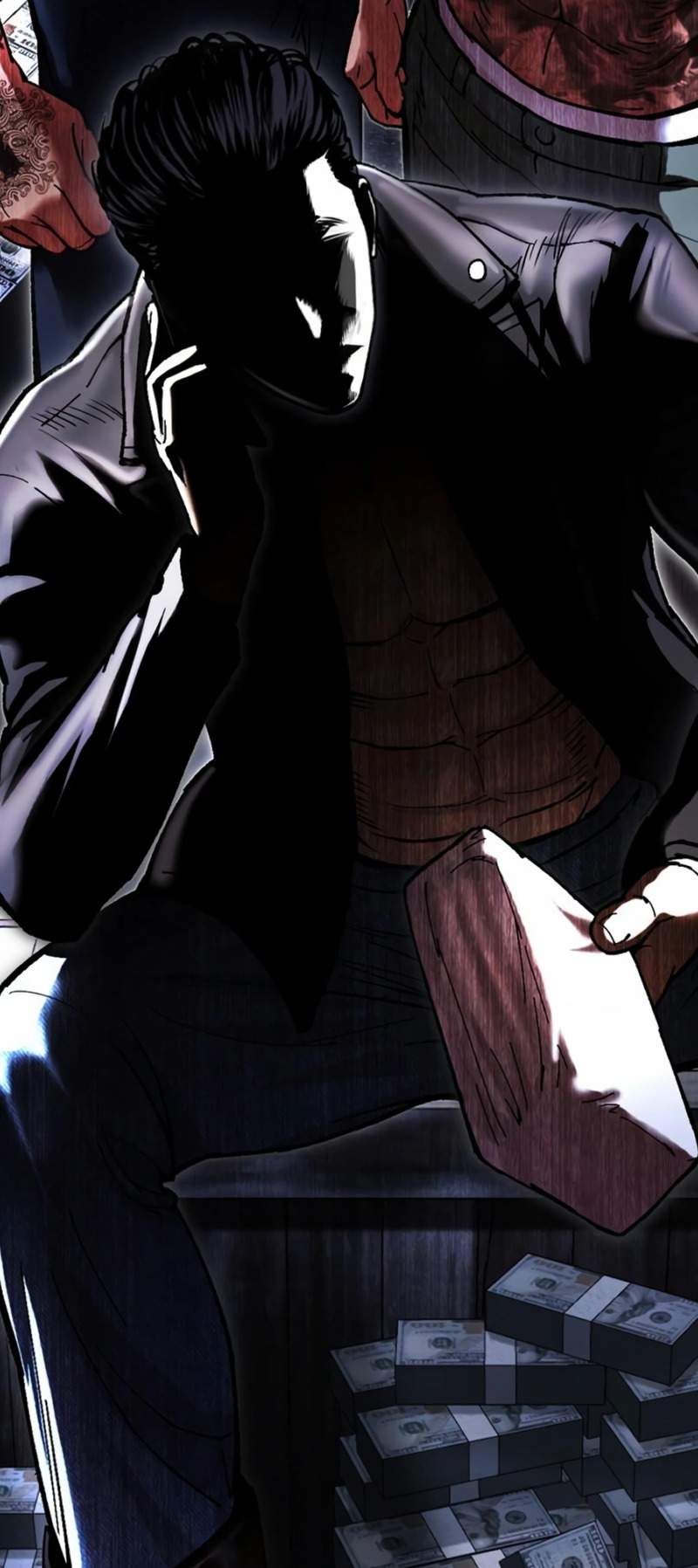
#☆#lookism#lookism spoilers#this may be guns backstory arc but i Will relate it back to gitae somehow hehe#if shingen had eyebags or if gitae had ui they would look even more similar#crack theory: what if shingen is gitae’s mom#gitae hates romance because of gap and shingens terrible love affair or whatever!!!#cant be disproven until we see what happened during the pre gen :)#shingen yamazaki#gitae kim
334 notes
·
View notes
Text
Do you even Christo bro?

#why’d they stop doing that#my theory is the ptsd from flying gave Dean some gaps in his memory#supernatural#spn#dean winchester#jensen ackles#salmon dean#sam winchester#4x04#spn 4x04#spn meta#dean studies#spn headcanon
74 notes
·
View notes
Text
Sauron, Galadriel, & Tolkien's Theology of Repentance - Part One

Summary: Character meta analysis on Sauron (and Galadriel, through the lens of Sauron). Based on both Silmarillion & RoP canon. 3.5k words. Discussion of Catholic theology involved. Blanket TW for discussion of violence, manipulation, etc., because Sauron. Spoilers for S1 & S2 and the Silmarillion, of course. The tragedy of Sauron is that he gets offered so many legitimate chances at redemption and forgiveness, and he denies them every single time. But we know he wants absolution, because that’s what he sees Galadriel as: his chance to bind himself back to the light, to be Mairon again, to heal the pain that he caused and that was caused to him under Morgoth. But because he has such a warped view of himself and his actions, he dismisses genuine extensions of compassion, forgiveness, and care as simultaneously beneath him and too good for him. And yet, he still pursues redemption, but through none of the channels offered to him.

In The Rings of Power, he’s given the explicit instruction to change for the good in the village after he’s reborn. He’s given the chance leave his past behind and work meaningfully in Númenor. He’s given the chance to redeem himself by Galadriel's offer of friendship (or love, depending on your interpretation). In the Silmarillion, he's even given the chance by Eönwë himself, and comes close to leaving Morgoth behind completely!
Let's look at this passage from Of the Rings of Power and the Third Age (emphasis mine):
When Thangorodrim was broken and Morgoth overthrown, Sauron put on his fair hue again and did obeisance to Eönwë the herald of Manwë, and abjured all his evil deeds. And some hold that this was not at first falsely done, but that Sauron in truth repented, if only out of fear, being dismayed by the fall of Morgoth and the great wrath of the Lords of the West. But it was not in the power of Eönwë to pardon those of his own order, and he commanded Sauron to return to Aman and there receive the judgement of Manwë. Then Sauron was ashamed, and he was unwilling to return in humiliation to receive from the Valar a sentence, it might be, of long servitude in proof of his good faith; for under Morgoth his power had been great. Therefore when Eönwë departed he hid himself in Middle-earth; and he fell back into evil, for the bonds that Morgoth had laid upon him were very strong.
This passage is clear that Eönwë is willing to pardon Sauron--he simply did not posses the power to do so. But when Sauron was told he must appeal directly Manwë, he gave up entirely and skulked back to Middle-earth. There are a few ways to read this:
1. He was not wholly repentant
Sauron simply wanted the protection of a new master in the absence of Melkor. i.e., he was rather fickle and simply wanted to be on whatever the "winning" side was. This is supported by the text literally saying that at least some of his obeisance was completely false, and that he only made a point of feeling bad about anything once his master had been chucked into the Void and his armies and strongholds were being destroyed (Thangorodrim). In this reading, perhaps Eönwë saw Sauron's treachery and referred him to Manwë knowing that it would be a test of his true intent. However, while a valid interpretation, I believe this to be the less holistic of the two.
2. He was truly repentant
Sauron did truly feel badly and "abjured all his evil deeds," but he was unwilling/unable to humble himself after being so fundamentally broken by Melkor and developing an insatiable power lust (hey, he isn't defined in the narrative by lust and pride for nothing).
Earlier in this same chapter, Tolkien wrote that Sauron could "...deceive all but the most wary." This is in the specific context of his physical shapeshifting. But, I would argue that this can also be tied to his lies. Tolkien has a specific ethic of beauty, where physical perfection is equated with moral goodness. Sauron completely inverts what is otherwise a hard and fast rule within Tolkien's writings by being the character most frequently described as "fair"--seven times to Lúthien's six, and she was the most beautiful woman to have ever lived!
(Side note: I have another post on Tolkien & beauty in the works where I'll get more into this idea)
Why does this matter? Even though this interaction with Eönwë takes place in the First Age, Sauron could at this point be in the demonic form Mirdania describes in the forge. And, I am inclined to believe that Eönwë, as the head Maiar and herald of Manwë, would be a pretty wary guy, and thus able to sense any of Sauron's trickery. I read this to mean that Eönwë looked at Sauron and saw his potential to be Mairon again, either in absence of his evil form or in spite of it.

Because Sauron is incredibly beautiful. And even if it is a disguise of the true, depreciated form of his spiritual essence, he presented himself to Eönwë at his most beautiful. He wanted, even in his act of repentance, to make himself more favorable in Eönwë's eyes. To show up as Mairon (who was likely close friends with Eönwë before everything went down, since they are considered to be two of the most powerful Maia and would have worked closely together).
But I don't think this was all manipulation on Sauron's end. I agree with the scholars mentioned in the text who believed that Sauron was truly repentant--which is why Eönwë even bothered referring him to Manwë instead of kicking him into the Void with Melkor.
And this is the tragedy: Sauron is told exactly how to repent, and believes fundamentally that it is an impossible path for him. And yet, he still longs so intrinsically for it! He was, under Aulë, a Maia of precision, perfection, and order. Under Morgoth, he feels disordered, dis-regulated. He needs to correct the fundamental imbalance within him, so why does he flee Eönwë?
It comes back to Sauron's pride.

If he follows through with this path of reconciliation, there is no way he can hide or pretend his actions away. If he cannot trick his fellow Maiar, he certainly cannot trick the Valar. And he cannot stand the idea of submitting himself back under their rule, especially now that he has tasted power. This is a pride wound; it is why the idea of confessing to Manwë would be humiliating to him as opposed to just upsetting/uncomfortable.
Again, the pivotal moment: he is told how to make amends for crimes and determines that he cannot do it. So he returns to Middle-earth and stews in his own self-hated and self-pity for a few years. In that time, he consciously or subconsciously latches onto Eönwë's offer--forgiveness from penance. It is the way forward. And if he cannot earn penance at Manwë's hand, he will do it on his own.
The Prodigal Son
This is where we have to talk about the Catholic roots of Tolkien's work for a moment. The scene where Sauron approaches Eönwë mirrors the biblical parable of the prodigal son. In this story, a man abandons his family, spends all his money, and falls into ruin. But when he recognizes his failings and returns to his father to get help, he is welcomed back into the family without question--in other words, he is forgiven and restored to his former position.
17 But when he [the prodigal son] came to himself he said, “How many of my father’s hired hands have bread enough and to spare, but here I am dying of hunger! 18 I will get up and go to my father, and I will say to him, ‘Father, I have sinned against heaven and before you; 19 I am no longer worthy to be called your son; treat me like one of your hired hands.’” 20 So he set off and went to his father. But while he was still far off, his father saw him and was filled with compassion; he ran and put his arms around him and kissed him. - Luke 15:11-32, NRSV CE (emphasis mine)
The parallel is clear; Mairon, the repentant Maia, returns home with hopes of reconciliation. He is prescribed the same task that the prodigal son offered to his father: he must be bound in servitude to his father/creator in order to pay off his debts. This is a deliberate allusion from Tolkien. The story of the prodigal son models the path of reconciliation that Eönwë describes. Tolkien seems to be drawing a line in the sand with this: Sauron is unwilling to do the work required by the Valar for repentance, so he is unable to receive the grace of a warm welcome back into the fold of the Ainur. Since he did not humble himself, he has to be told to do it. And he does not want to! He wants to be loved, but he also wants his power--evidence, in a way, of how his character was fundamentally altered in his time with Morgoth.

His pride--and his fear--cut him off from the potential of grace. He does not know for certain that Manwë would subject him to servitude (though I would argue that it's textually evident that it is a custom), but this assumption leads him to flee, which allows him to slip back into his old ways.
He wants to be Mairon (admirable) again, not Sauron (abhorrent). He wants to be accepted and loved, but not punished. He wants the benefits of reconciliation without the work he would have to do to earn it or the shame he would feel as he did. It's pride, but it's also deep shame--the flip side of his extreme ego is an implicit self-hatred, one that we can see in the subtext of how he speaks about himself and about his time with Morgoth.
Even the language Tolkien uses is heavily shame-coded, especially in a Catholic context; Mairon did not go willingly, he was "seduced." He admits to Celebrimbor that he was "tortured by a god". It becomes exceedingly clear through both text and on-screen canon that Sauron was routinely broken and abused for centuries. This has fundamentally damaged his self-perception, which is ultimately what leads him to "[fall] back into evil"--whether due to pride or shame, he hides, perhaps because he consciously or subconsciously does not believe that he deserves forgiveness, no matter how much he craves it.

Naked in the Garden
His flight back to Middle-earth after meeting Eönwë is reminiscent of another biblical scene, where Adam and Eve, after committing the first sin, hide from God in shame and fear (emphasis mine):
7 Then the eyes of both were opened, and they knew that they were naked...9 But the Lord God called to the man, and said to him, “Where are you?” 10 He said, “I heard the sound of you in the garden, and I was afraid, because I was naked; and I hid myself.” -Genesis 7-10, NRSV CE
The image of nakedness is, here, one of vulnerability, and Tolkien establishes that Sauron fears that which he cannot control. He needs the Rings under his power. He needs his armies and his enemies under his watchful eye. He is petrified of letting his power slip away (possibly due to never wanting to feel powerless in the hands of a Vala, fallen or not, again).
The biblical allusion here hearkens back to the fear Tolkien describes Sauron as feeling regarding his return to the Ainur. In the religious system Tolkien has established, which is likely inspired by his own religious beliefs, Sauron has sinned, and must make penance. But he is afraid of God/Manwë, and does not want to "let go" of his sin. In other words, he is not truly repentant. This reflects the Catholic sacrament of confession, which requires self-reflection and resolve to never commit the sin again.
Instead of shame driving him to contrition, it drives him to isolation.
But he still wants forgiveness. So, in his years of hiding in Middle-earth, he decides to earn it himself. His own way.

Enter the Rings.
Sauron wants to perfect the wrong he wreaked so that he can both earn his way back into the Ainur and keep his power. But what he does not realize is that this does not work. Eönwë is clear that he must forsake his true temptation--absolute power--through penance by submission. Yet Sauron in his pride thinks he can have it all. Sauron is a very carefully controlled villain, and the only times he snaps or makes significant mistakes are when his inflated self-perception is challenged, revealing the self-loathing and/or self-pity underneath. The best example of this is when he kills Celebrimbor prematurely, and cries afterwards. Why? Because Celebrimbor was right about him, and he hates it. He hates knowing that he is nothing more than the Morgoth's shadow, because Morgoth was his master as much as he was his tormentor. As Sauron puts it, his relationship with Morgoth was often defined by pain as a test to see "whose will was the mightier":
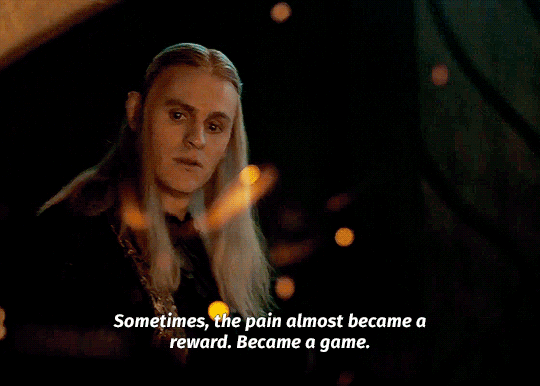
This image carries more shame, both in its implicit sexual connotations and in the simple power dynamic of it. Sauron, even though misguided, is rallying against Morgoth. He wants to break what Morgoth has created and build something new, something better, something apart from his old master entirely. But Celebrimbor confronts him with reality: he has not created something new, and perfect, and special, as he so wanted to--he can only act in imitation, not in generation. And when he got close with the Rings, it cost him everything. It's almost like he wants the power of a Vala, and loathes that he cannot attain it.
And this is why he becomes so singularly obsessed with Galadriel.

She’s his foil. They both crave power and adoration, but in the end of things, she does not fold under his temptation. She turns down everything she has ever wanted for the greater good and for the sake of her own soul. Sauron looks at Galadriel and perceives that she would have succeeded at Eönwë's test because she is willing and able to humble herself. This maddens him to the point of both desiring her and desiring to break her.
She learns that she is easily tempted and becomes strong enough to handle it (through a lot of tough love from Elrond & co.). She has to learn how to do it, but she is able to.
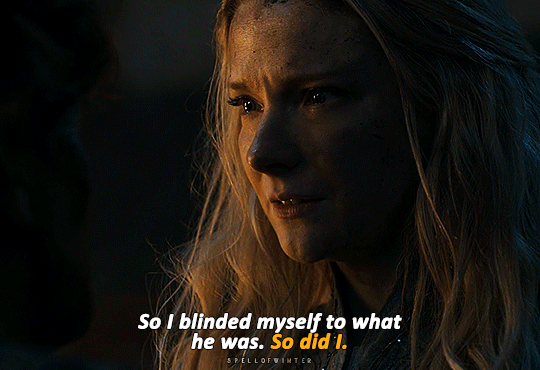

She grows from someone who resisted and rejected authority to someone who is trusted as an authority because of her ability to wield it wisely (see: Gil-galad allowing her to answer for him in 2x08).
In other words, she earns the trust, love, and support of her community. Sauron has to force his to comply—it is an illusion of love.
His possessive obsession with her also stems from her fairness. She was the object of her uncle Fëanor's obsessive desire for creation as well. Her hair was the inspiration of the Silmarils (see: The History of Galadriel and Celeborn; The Shibboleth of Fëanor - source with page #s here), which Morgoth desired more than anything to possess.
Sauron, wanting to spite his master, wants one better--to own that which inspired the Silmarils, to own the image of fairness (and thus of moral good) completely. This is why he wants to bind himself to her. This is why he needs her. He sees Galadriel as his mechanism of repentance, and his last triumph over Morgoth. Winning her is his salvation as much as it is proving that his will is the mightier. It is his way of dominating Morgoth. This starts, I think, as a genuine effort at proving himself to the Valar, but quickly consumes him entirely. He is overcome with the desire for revenge, just as Galadriel was at the beginning of the First Age.
And he sees this in her. Sees their similarities. Sees that she, too, is angry and lonely and so afraid of losing her power. And he leverages that to befriend her. This is where it gets ambiguous and you can read RoP as either painting the image of Sauron being earnest but completely misguided in his proposal, or you can see it as him being entirely manipulative.
I think the truth of that scene probably falls somewhere in the middle; just like when he presents himself to Eönwë, he is sincere in his desire, but only knows how to present it in an inherently contriving way. He does want to bind her to him, so he tries to only reveal to her the good aspect of that desire (and also of his desire for power, which he allows her to see because he believes that it is good and also because she understands it), and not the ugly underside of his internal struggle against Morgoth, the Valar, and himself.
And I do think, in his own way, he cared about her. Galadriel consistently shows kindness and compassion to him. In S1, they grow to know each other's minds and souls, and she considers him a close friend. He finds comfort in this, that someone could see the blackness of his heart and care for him anyway. He thought, in his isolation, that he lost that chance when he fled back to Middle-earth. And here is the very picture of the light itself telling him that she supports him, that she sees the good in him, that she wants to help him set the world to rights! Of course he is infatuated by this. Of course he also wants to use it. He is Sauron.
But Galadriel succeeds where he fails, so he stops playing nice and tries to forcibly drag her down with him. First, by baiting her with the image of the man she cared deeply for:
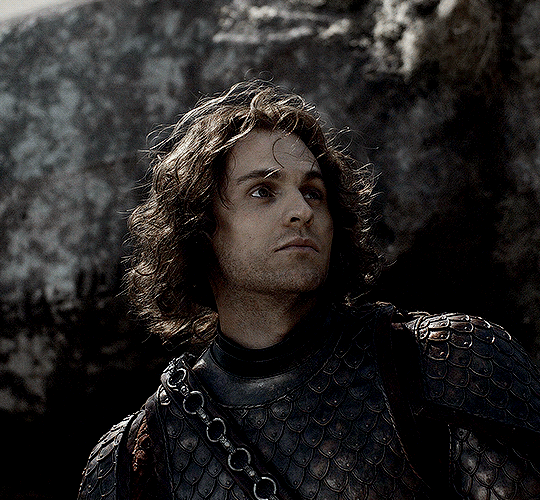
Then, by reminding her of all she is losing by rejecting him:

And she is still strong enough to say no. And not just to say no, but to shut the door completely. To look in the face of everything she has desired for centuries and turn it down, understanding that it will ruin her. Yes, she hesitates. Yes, she still wants it (wants him). But she wins the day by holding fast to the light that Sauron wishes so badly to bind himself to.
Because she has lost everything--her brother, her husband, the station as commander, the trust of her high king and best friend--and earns it back only through her resistance of her greatest temptation. It is a struggle, it is painful, it nearly kills her--but she does it. She wins the test that Sauron could not even bear to face.
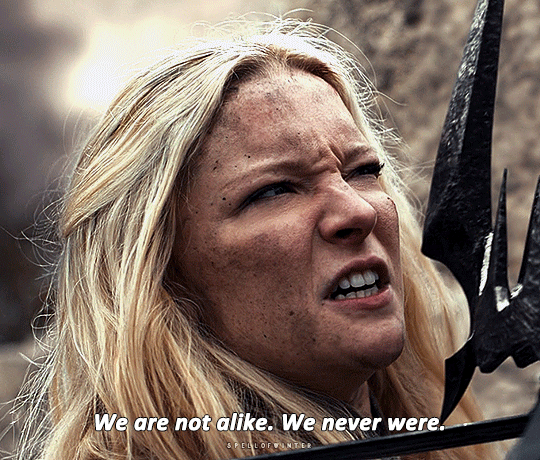
In their headlong, self-sacrificial tendencies, they are the same. Both view themselves as fundamentally stronger/better than their peers while also being deeply lonely due to their self-imposed isolation (Galadriel's laser-focused hunt for revenge, Sauron's exile in Middle-earth). But to Galadriel, the light is more important than her pride.
For Sauron, the light is his source of pride. He desires it more than anything, but condemns himself to never being able to touch it due to his rejection of Eönwë's offer. Paradoxically, he tries to grasp at it through Galadriel, the living silmaril, and succeeds only in darkening her. We learn from Gil-galad in 2x08 that his crown piercing her flesh in an act of brutal domination nearly strips her soul from her and pitches it into the unseen world. In this, Sauron is saying: If I cannot have you, I will force you to need me. I will break you into loving me.

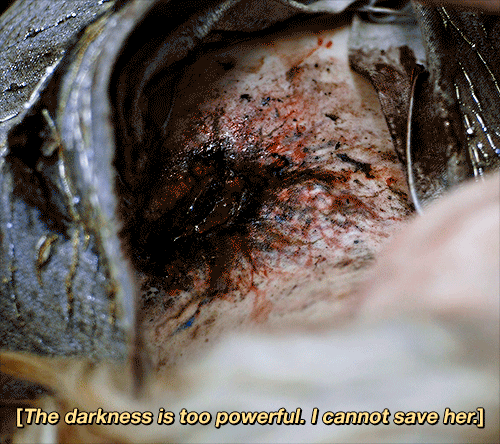
He says this to Celebrimbor as well. He no longer knows how to love properly. He only knows how to inflict pain until this object of his obessive desire needs him--just like how his immortal spirit was broken into submission by Morgoth. And isn't this revealing of his own sense of self? He refuses to suffer the path of light, but willingly suffers the maddening path of darkness because it is a comfortable, familiar suffering. One, he tells Celebrimbor, he even grew to enjoy (2x08). As the path of the Rings drive him madder and madder, his desire for the light (Galadriel) and the return of his power (Celebrimbor) become further disordered and corrupted until they culminate in him destroying them--and his chance at earning/owning them--entirely.

And this is Sauron's ultimate point of no return (which we will hopefully see in S3 🤞). The razing of Eregion and slaying of Celebrimbor were acts of petty rage he committed when his pride was injured. This was the final nail in the coffin. Galadriel, in her rejection of him, ruins what he sees as his true chance for redemption.
Galadriel, now stepping into the role of Eönwë, re-opens the invitation: "Heal yourself!" (2x08). But in rage and shame and stubborn pride, he turns it down again. I believe this is where his desire to heal Middle-earth shifts fundamentally into desire to dominate Middle-earth. He always wanted to rule, but now he wants to own.

#fae speaks#I spent hours pouring thru the Silm and RoP for this so if you enjoyed please let me know I'd love love love to talk about it more <33#sauron is my favorite freak in all of tolkien's lore rn I want to study him like a bug#btw this is saurondriel (and even silvergifting? if u squint) positive but with loads of nuance. i see haladriel as love and saurondriel as#possession. both are fun in fiction of course but I want to acknowledge how deeply messed up the dynamic is#but also! it's fiction! do whatever you want with it! if you want saurondriel to get a happy ending then do it <3#and send me the fic so i can read it because i'm team half-maia celebrian hehe#also if there are any glaring gaps in my knowledge of the silm pls lemme know it's been a minute since i've read it all the way through#part two will be on beauty and evil in tolkien's cosmology :)#tolkien#the silmarillion#the rings of power#rings of power#trop#rop#sauron#halbrand#annatar#galadriel#sauron x galadriel#saurondriel#haladriel#trop spoilers#trop season 2#trop meta#rop meta#rop theory#trop theory#celebrimbor#my metas
174 notes
·
View notes
Text
hmmmm unpopular opinion of the day but i think movies!anakin and clone wars!anakin can and should coexist in the same character
#it's a front guys. it's all a front#that cocky confident hero-with-no-fear persona is a FRONT it's a FACADE it's a facet of his deep-seeded need to HELP#it's literally entirely for the purpose of keeping ahsoka's and obi-wan's and the clones' and everyone he loves' morale up#now. do i think that this could have been executed better? yes. i will admit. as much as i love the clone wars. they could have made#this more clear#and you know what? i'm gonna say it. the clovis interactions? ARE out-of-character pre-rots#but anyway that's my anakin theory#i think the divide isn't as wide a gap as some people think it is#star wars#master disaster himself
64 notes
·
View notes
Text




I LOVE THEM OH MY GOODNESS AAAAAHHH
#gap the series#gap pink theory#monsam#sammon#freenbecky#freenandbecky#mon x sam#becky armstrong#gl#freen sarocha#loyal pin#the loyal pin#anilpin#pinpak
168 notes
·
View notes
Text
Homicipher Theory
Mr. Gap: The Homicidal Stalker
Disclaimer: This is all just my own interpretation and speculation. This is not negative or an attack on the character. I love Mr. Gap for being the worst of the worst. He’s sickening and awful and makes my skin crawl but in the best way that horror fiction can manage.
That said, Trigger Warnings: Mentions of stalking, sexual assault, serial killing, and cannibalism
Also
Homicipher spoilers/Mr Gap ending spoilers
-
If we go by my pre-established theory that the Ghost Apartments are a haunted grounds where an apartment building was built over the ruins of a hospital and collapsed subway, then we must assume that it’s haunted by ghosts from many different time periods. I believe that ghosts like Mr. Crawling and Mr. Hood are among the oldest, original haunts. Ghosts like Mr. Silvair and the nurse are from the hospital time period. Some ghosts are from the subway collapse. And some, like Mr. Gap and the Bride, are more recent, from when the apartment building still had occupants before its abandonment.
Mr. Gap is a rather unique entity among the ghosts. He’s the only one who can be anywhere at any time, can easily shift between the real world and the spirit realm, and clearly understands that he is a ghost.
But why? What makes him special?
I fear that the answer may be an unsavory one...
Mr. Gap
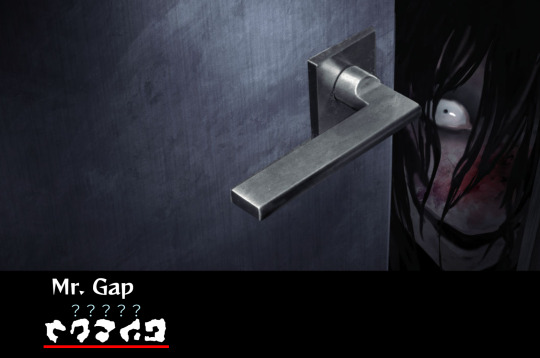
Mr. Gap is the second entity we can meet once we wake up with control of ourselves in the Ghost Apartments. Moments before we meet him, Mr. Hood gives us a warning. He tells us to be careful, there are dangerous entities out there.
Ignoring his advice entirely, we interact with Mr. Gap. And since we don’t know the language yet, we’re very likely to smile at him, resulting in our first swift death of the game via getting our heart ripped out and eaten.
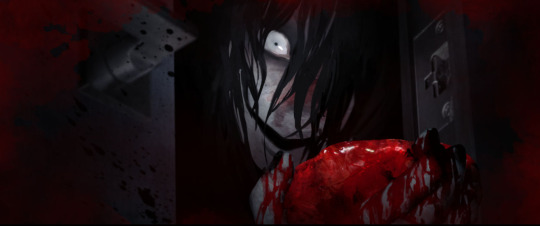
The best thing we can do in early game is to ignore him. When he asks for a body part, step away. Later on, we can interact with him more directly, but initially, survival means not flashing him our pearly whites.
It becomes obvious early on why he’s called Mr. Gap. It’s because he…well, he only exists in gaps. He’s not a roaming ghost, he appears to be bound by the walls of this ever-changing building. But wherever there’s a hole in the wall, there’s Mr. Gap, peering out from between strands of greasy hair with one eye.
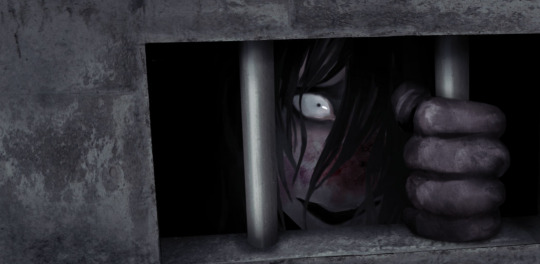
Every time we interact with him, he requests a body part from us. Heart, arm, leg, head…and he means this literally. If we consent (or even just smile at him) he’ll devour whatever body part he asked for.

But he can be helpful. While being chased by Mr. Hugeface, we can desperately ask him to get us out of there and force ourselves into a vent with him. He agrees to take us to safety, though not out of the kindness of his heart. He always wants something in return. Fortunately for us, he settles for just some of our hair this time.

There is never a time when he’s not trying to weasel something out of us. Even in his own endings, he bargains and pleads for our heart.
Now, you can easily interpret this to simply mean that he’s some sort of mischievous spirit. Evil in the eyes of humans, but more of a representation of chaotic neutral yokai. Certainly, some of the entities in the Ghost Apartments bear loose similarities to yokai. And the tropes of bargaining and trickery go hand in hand with these sorts of myths.
Personally, I lean away from that reading because the game actually doesn’t seem to use very much in the way of Japanese yokai myths. I dug deep trying to drawn comparisons for each of the ghosts, but they were loose at best. There seems much more evidence that the ghosts are, as the name implies, actual ghosts of humans who died here, rather than spiritual entities.
And if that’s the case, it begs the question: Who was Mr. Gap? How did he die? Why does he haunt rather than move on into the afterlife?
I feel that the imagery of his character makes the answers obvious. The game takes place in an apartment building where Mr. Gap lives in the walls. I think that’s a direct reference to his life before death.
I theorize that when the apartment was inhabited, Mr. Gap was a man who crept through crawlspaces and inside of walls in order to spy on women. I believe it can be interpreted that he also lured, abused, and killed those women.
“Mighty hefty accusations, Wren. Where’s your proof?”
No proof, only evidence from my own interpretation to support the claims! I'm sure there are plenty of other ways to interpret his character, this is just mine!
Exhibit A - Living in the walls. Again, this seems the most obvious and on-the-nose point. He quite literally lives in the walls and is bound to spaces with gaps. But he also has an apparently innate ability to navigate the ghost apartments no matter how much it shift and changes. This could allude to how he had the internal structure of the apartment building perfectly mapped when he was alive.
More importantly, he only makes himself seen through holes in the walls and gaps like vents. And we know he’s watching us at all times from those very gaps. This is a direct reference to him being a peeping Tom. Even the other ghosts seem to recognize this, as we can get a humorous scene of Mr. Silvair taping up a hole in the wall so that Mr. Gap can’t look inside.
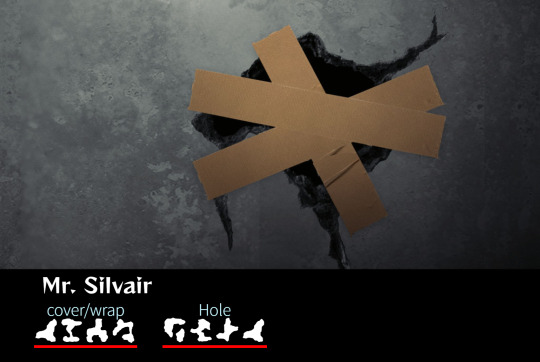
Exhibit B - Self Awareness. This is the most fascinating aspect of Mr. Gap, in my opinion. Most of the ghosts we meet seem fragmented or confused. If they know what they are, or were, they don’t show it. They seem to understand that there’s an “other” place, but not really the distinction between life and death.
Mr. Gap, however, outright knows and brags about being a ghost. At one point, he shows us old newspaper clippings with a photo of three women with censored faces standing in front of the apartment building, with Mr. Gap in a window behind them.

He can, and does, travel between realms. I assume this is possible because he’s bound to spaces within the apartment, but not specifically spaces in the spirit realm. The apartment is his cage, not the spirit realm itself. Because of this, he’s perfectly capable of peering out at modern day strangers walking by on the street and in the alleys. Also perfectly capable of haunting the old building and keeping its property value at a hearty zero.
But what does self awareness have to do with him being a criminal stalker and killer? Well, I think that he’s afforded these sort of rule-breaking abilities for one main reason, which brings me to…
Exhibit C - He’s a psychopath. No, I’m not using the term colloquially. I mean that truly, by definition, Mr. Gap is a psychopath. To be more accurate, by today’s definitions in the DSM-5, he would have Antisocial Personality Disorder (ASPD), characterized by a lack of empathy, disregard for others, and deceitfulness (*ASPD is more complex than this, please do not take this as a statement on the disorder which is characterized by much more than these three things).
If this seems like a stretch, I invite you to look at the three endings you can get at a particular point in the game, all involving Mr. Gap.
In this unfortunate decision path, we manage to escape the Ghost Apartments. However, by this points we’re too far gone to be able to live among normal society. Not only has our memory been warped by the ghost realm, but our body is unrecognizable and grotesquely inhuman. We know this based on the reaction of the first person we ask for directions. He panics at the sight of us and flees. We are, for all intents and purposes, the rotting Michael Afton parading about as a normal human while looking like a decaying zombie.

At this point there’s only one person left who can help us. Mr. Gap. Since he’s the only one who can cross between worlds. But even at our darkest and most vulnerable moment, is he going to help out of the kindness of his heart? No, of course not! In fact, he takes it as the perfect opportunity to ask for our heart again, the same way he did the very first time we spoke to him.
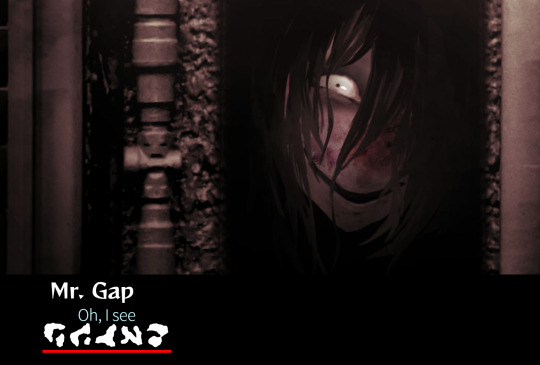
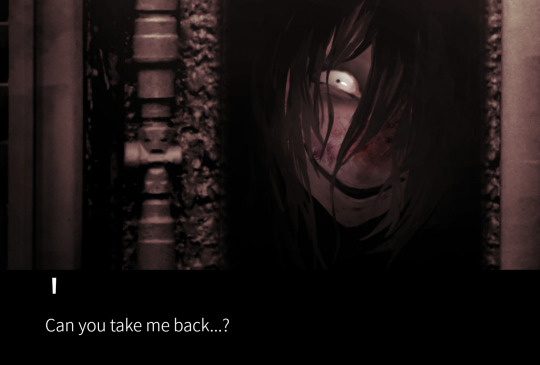

We have three options. 1, give him our heart. As expected, the ending is the same as the beginning. He kills us and eats our heart. 2, refuse to give him our heart. He’s disappointed, but leaves us alone. We wander down the alley but don’t get far before we pass out. And then…Mr. Gap takes our unconscious body and, wouldn’t you know it, eats us anyway.
In the third option, we give him someone else’s heart. We kill a random person and deliver their heart to Mr. Gap instead. He’s not exactly pleased but he did make a deal to bring us back, so he reluctantly drags us back into the apartment.
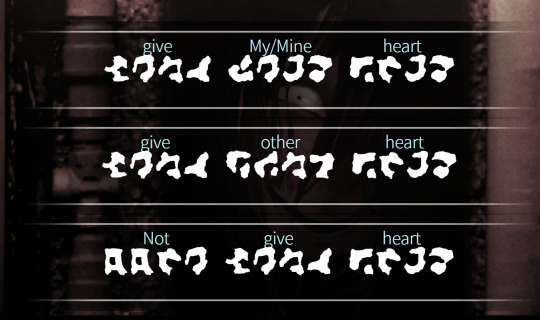
Sadly, while Mr. Gap is able to cross realms at will, he can’t bring us across. Instead, it seems he just brings us inside of the abandoned apartment. We don’t fully understand this though, which seems deceptive on his part. Sure, yes, he brought us back as promised. But not to where we wanted to be.
Now, it’s just us and Mr. Gap. Of course, he keeps begging for body parts. Except now, we have the chance to ask him why. The question…confuses him, even seems to irritate him. “Why?” What reason does there need to be besides that it’s fun?

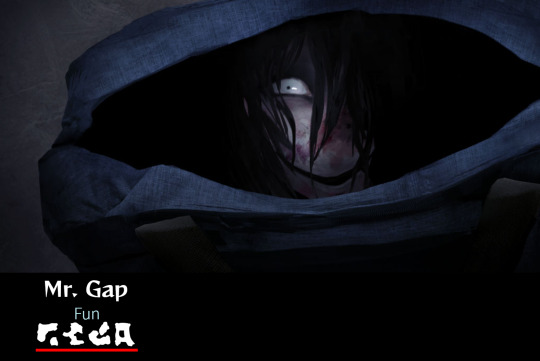
Honestly, this interaction was bone-chilling to me. By no stretch of the imagination does Mr. Gap view us as anything more than a shiny toy (that was how I felt about it here at least).
I believe it’s this callousness that acts as his superpower. Unlike the other ghosts, he doesn’t have any emotional attachments preventing him from moving on to the afterlife. There’s no particularly strong thing keeping him here. He’s not repenting (Mr. Hood), he’s not in a cycle of suffering (Ms. Blue-Clad/Mr. Chopped), he’s not obsessively invested in his life’s purpose (Mr. Silvair). He’s just. Having fun.
I think this is a carry-over from when he was alive. He had no particular reason for stalking and killing beyond the fact that it was fun for him.
Because of this, he’s not trapped in the same way as the other ghosts. He’s actually quite content to cross between realms and peep at women who wander by. And if he’s real lucky, someone will get close enough to snatch.
Exhibit D - The Newspaper Clippings. What’s so special about them apart from the clear fact that he’s bragging about being a ghost? Well…I don’t think that’s all that he was bragging about. This old clipping includes a picture of three women with censored faces standing in front of the apartment. Victims, perhaps? It’s quite common for serial killers to keep trophies or memorabilia of their kills. Taking newspaper clippings reporting on the crime is actually a big one.

Exhibit E - Cannibalism. Now this, I believe, could be either literal or metaphorical, or a combination of both. When he was prowling and murdering women, did he actually eat them as well? Maybe. Or maybe the afterlife cannibalism is metaphorical, depicting him as a predator, with us as prey. The symbolism of flesh eating is violating, as well, and his biggest interest is in eating our heart. This could line up with a common delusion among stalkers, in which they believe the object of their delusions is in love with them.

Exhibit F - Sexual Assault. You may think this is a stretch and it’s bad enough that he could have been a serial killer and I’d agree with you. But I really think there’s enough here to at least suggest that he included sexual assault in his modus operandi. For one thing, he was a peeping tom, unquestionably. That’s the whole point of the holes and gaps that he peeks out of. This suggests sexual motivation for his actions. Then, there’s the possible symbolism of cannibalism meaning that he’s a predator. And, as also stated, when he brags about being spotted as a ghost, it’s on a newspaper clipping with only women, which lends credence to the idea that he stalked and spied on them specifically.
And lastly, the biggest evidence I have towards this point is in the Return Ending. At the very end, he makes his finally appearance under our sheets. This imagery feels intentional and deliberate. We lift the sheets and see him essentially between our legs. We dismiss him as being a prankster, and this ending concludes with him suddenly lunging from under the blankets with a wicked grin and hands outstretched to presumably harm us.


And that’s it. Fade to black.
To me, this reads obviously as a reference to assault. The stalker is in our bed, between our legs, and leaps to violently harm us.
We know that Mr. Gap doesn’t have a body, only arms and a face. So, this action appears to be simply a reflection of the actions he performed when he was alive. OR there’s also the possibility that he lied to us, and he does, in fact, have a body. I wouldn’t put it past him.
-
So, is it possible that Mr. Gap really is a reflection of some of the worst parts of humanity? Maybe. Or maybe he does love us, or he is just a mischievous yokai. I like the thought that he's a monster who gets away with it because everyone views him as an irritation rather than a real threat. Even if I'm way off base, he's still a totally fascinating character due to his uniqueness among the other present entities.
Honestly, serial killer or not, who would say no to a face like this?
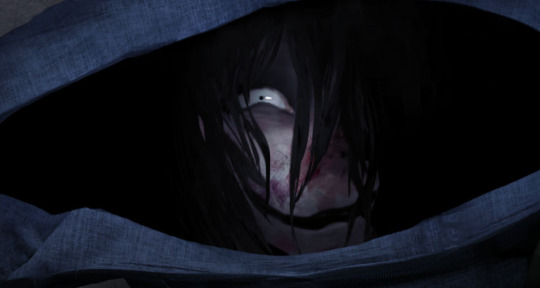
#homicipher theory#homicipher#mr gap#mr gap homicipher#homicipher spoilers#game theory#character theory#homicipher game#dark topics#content warning
83 notes
·
View notes
Note
what is the age gap between the Broker and Brooklynn? I’m just curious how old the broker is and how long she’s been doing this dinosaur trading venture
Mmhm, of course hehe.
This is a very funny question to me because I remember having this discussion about Santos' age with some of the other storyboard artists back when there was talk about leaning into more of a Killing Eve angle with her and Brooklynn (the final decision on how far we leaned into that was not our decision to make, I will note), and whether or not fans would find an age gap between them 'problematic' if we did lean into it too far LOL.
Because Dichen Lachman was TECHNICALLY around 39 or 40 when Dominion was filmed and took place... but I honestly have no idea if SANTOS is supposed to be that age, as well. Dichen's just got that really ageless look. If you told me Santos was in her late 20s to mid 30s I'd believe it just as easily.
#somewhere in her 30s honestly feels right to me personally#but Santos has no canon age that I am aware of#I think the board team discussed this once and went 'eh'#lol#jurassic world chaos theory#jwct#spoilers#soyona santos#ask#anonymous#storyboard artist#chaos crew#but also on the topic of whether the age gap is problematic.... this woman kills people who get in her way with dinosaurs#she tried to kill Brooklynn and the N5#I think the age gap is the least of their worries haha#oh and as far as how long she's been trading dinosaurs... long enough!#I think Dichen Lachmen herself came up with a whole backstory for her that she's talked about in interviews#and we used some of it in the show
132 notes
·
View notes
Text

Were Carmy and Syd texting a lot and spending a lot of time together during this time?
I ask because the text from carmy is very casual and sarcastic, there's familarity and humor involved when she asks if Fak has real tools. (Carmy knows this much because he asks for faks real tools when he's ready to fix their table)
Back to the timeline and chance where they spent time together: Sydney comes back to work with Carmy in December (the holiday song that plays at the beginning of 1x08).
2x01 is in March, and at the end, it's 18 weeks until it's open. 2x02 pasta is 12 weeks til open- they had a month to spend time together.
So they have 1.- 3 months to talk- 3 months to discuss plans for the bear, the budget, and plans for renovation from December to March. 3 months to get to know each other.
The another month to spend together before he reunited with Claire.

The scene where Sydney asks, “Still good to jam on menu later?" It’s clear they’ve bonded over brainstorming in the past.
Then there's that moment when Carmy turns back to her once he says, "Yes, chef." It felt like Sydney was about to chime in, too, (maybe asking if she left something at his place??) but then Marcus swoops in and interrupts just as he stood between them a scene later when Carmy asks her if she wants to work at the apartment.

Another thing when Carmy says this- it's the apartment, not my. I believe this was a specific detail.
It seems like Sydney was at his apartment for the first time 2x02 BUT he says the apartment like she's been to his place before.


She walks in and looks around the apartment—does it look different from the last time she was there? It seems messy. She looks at the remote on the table, the crooked curtains, and the nail on the wall—maybe there was a picture there when she went to the apartment last time.
They spent time together, but it was mostly work-related. Aka scrunchie portal, she also asks him if he's still thinking about the chaos menu.

This show loves to play with time, so what if we get a timeline episode of Sydney and carmy being actual partners before season 2 starts or the weeks between 2x01 and 2x02? We still get clues about how close they're getting with the matching sweaters, we know this because this was the one and only time Sydney is comfortable enough talking to carmy about her father with Carmy in the beginning of the episode.
Closer than we thought, perhaps?
#sydcarmy#season 4 theories#i got timeline questions.#debunk this theory if im missing something#this gap could be a sydney center episode with sydney leaving her scrunchie at his place 🥺
82 notes
·
View notes
Text
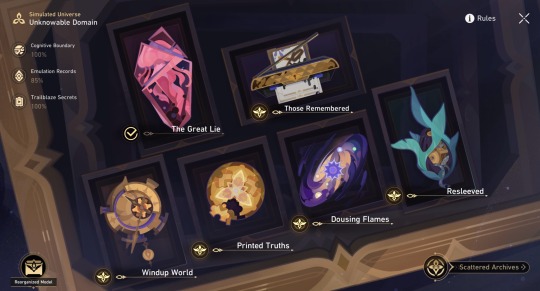
guys…. i fear this may be sampo’s backstory
#⌞ ༄ hsr ⌝#just read through all of it and yeahhhhh#more erudition-aligned than i’d first assumed but the tavern at the end is definitely elation#plus there are still some gaps (especially between ‘windup world’ and the present day) that could be filled with more interpretations#sampo koski#sampo hsr#hsr sampo#hsr#honkai star rail#honkai: star rail#hsr theory
76 notes
·
View notes
Text
can we please talk about the fact that ben doesnt have a tooth gap anymore… WHERE DID IT GO MAN??!!!


166 notes
·
View notes
Text
GR's insta story | 11 May 2025
#a delightful treat to have george back on my bullshit#i have half a theory that he misses having daniel to goof around with#so he's trying to fill that gap by teasing someone he thinks will get it#not that he hasn't always done this#he's just ramped it up#whatever the root cause i'm so here for it#george and lando#george russell#lando norris#miami 2025#lego cars#drivers parade
46 notes
·
View notes